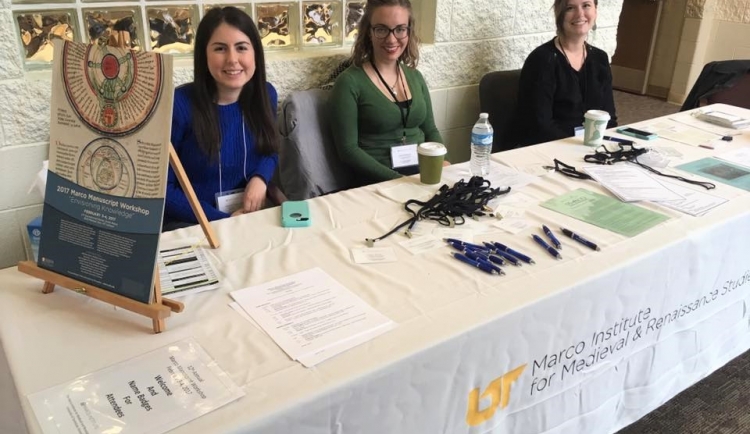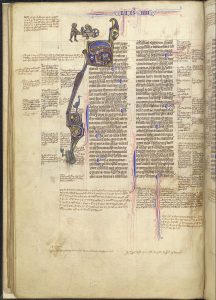17th Annual Marco Manuscript Workshop
“Interventions”
February 4-5, 2022
.
About
The seventeenth annual Marco Manuscript Workshop will take place Friday, February 4, and Saturday, February 5, 2022, in person at the University of Tennessee, Knoxville. The workshop is organized by Professors Maura K. Lafferty (Classics) and Roy M. Liuzza (English), and is hosted by the Marco Institute for Medieval and Renaissance Studies.
This year’s workshop explores the idea of “interventions.” Some manuscripts are pristine, their ink dark and their colors bright, their pages gleaming and unworn. They sit in our modern libraries as fresh as the day they emerged from their scriptorium; their deceptive newness dazzles the eye. Most manuscripts, however, bear signs of use or the marks of their eventful histories, the traces of their lives among readers and in libraries. Many readers worked with a pen, or a knife, in their hand, and they have left their marks on books in various ways—corrections, glosses, annotations, additions, emendations, censored passages, reordered pages and quires, attempts at restoration or refreshing a faded page, supplying missing text on new leaves, even breaking a manuscript apart into several separate books. Some of these readerly acts correct perceived deficiencies in the text, some seek to improve or update, while others try to repair the damage wrought by time and accident on the book. All these practices indicate that the reader thought the book contained some sort of difficulty that needed intervention; they mark the moment when a reader has stepped in to solve a problem. These signs of use and wear capture the intersection of two histories, the book and the reader; they track the process of reading and responding to the book, and help us reconstruct the life and afterlife of manuscripts and texts. As always, we welcome presentations on any aspect of this topic, broadly imagined.
The workshop is open to scholars and graduate students in any field who are engaged in textual editing, manuscript studies, or epigraphy. Individual 75-minute sessions will be devoted to each project; participants will be asked to introduce their text and its context, discuss their approach to working with their material, and exchange ideas and information with other participants. As in previous years, the workshop is intended to be more like a class than a conference; participants are encouraged to share new discoveries and unfinished work, to discuss both their successes and frustrations, to offer practical advice and theoretical insights, and to work together towards developing better professional skills for textual and codicological work. We particularly invite the presentation of works in progress, unusual problems, practical difficulties, and new or experimental models for studying or representing manuscript texts. Presenters will receive a $500 honorarium for their participation.
The deadline for applications is September 24, 2021. Please note that this is an earlier deadline than in years past. Applicants are asked to submit a current CV and a two-page abstract of their project to Roy M. Liuzza, preferably via email to rliuzza@utk.edu, or by mail to the Department of English, University of Tennessee, 301 McClung Tower, Knoxville, TN 37996-0430.
The workshop is also open at no cost to scholars and students who do not wish to present their own work but are interested in sharing a lively weekend of discussion and ideas about manuscript studies. Further details will be available later in the year; please contact the Marco Institute at marco@utk.edu for more information.
.2022 Workshop Schedule:
Friday, February 4
Location: Great Room, International House, 1623 Melrose Ave
8:30 am Registration and coffee
9:00 am opening remarks
Session One
9:15 am Helene Scheck (U of Albany). “Reconfiguring Jerome’s Correspondence: An Overlooked Letter Collection and its Offshoots.”
10:30 am coffee break
10:45 am Kate Falardeau (Kings College Cambridge). “The Manuscript Presentation and Material Afterlife of Bede’s Martyrology: A Case Study”
12:30 pm Lunch
Session Two
2:00 pm Ruen-Chuan Ma (Utah Valley U). “Magnifying the Magnificat: Text and Sound in Manuscripts of Lydgate’s Life of our Lady.”
3:15 pm coffee break
3:30 pm Britt Mize (Texas A&M). “Scribe A’s Interventions as Editor of the N-Town Plays: Rhyming Practices and the Communities of East Anglian Drama.”
6:30 pm Dinner
Saturday, February 5
Location: West Wing, Haslam Business Building, 1000 Volunteer Blvd
8:30 am registration and coffee
Session Three
9:00 am Caitlin Branum Thrash (U of Tennessee–Knoxville). “Icing on the Cake: Interventions in English Women’s Devotional Manuscripts.”
10:15 am coffee break
10:30 am Elena Shadrina (Harvard U). “Private Documents in Medieval Venice.”
12:00 pm lunch
1:30 pm Shirley Kinney (U Toronto). “Intervention and Reader Interaction in the Manuscripts of the Herbarium of Pseudo-Apuleius.”
2:45 pm coffee break
3:00 pm Rachel Wilson (Yale U). “Alteration and Omission in Anglo-Norman Autograph Historical Manuscripts.”
Dinner
Additional Information:
For in-person events, visitor parking is located in the Volunteer Hall Garage (1545 White Ave.). Further details about UT visitor parking are available at the Parking & Transit Services website.
Free street parking is available in the neighborhoods around campus (e.g. Fort Sanders), but cannot be guaranteed. Guests can also get to campus via the free trolley from downtown.
The campus map is available online here.
Please contact Roy Liuzza or the Marco Institute for more information.


